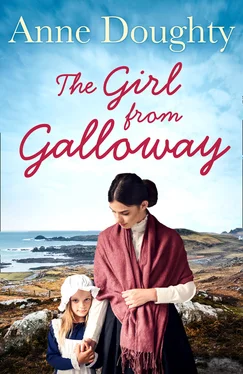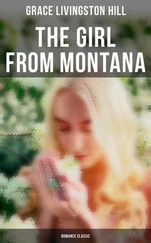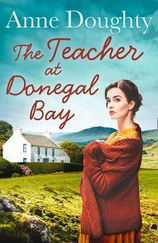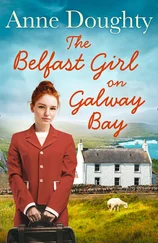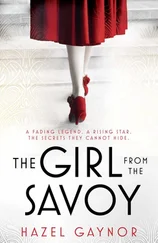From early May till late October, or even November, if there was other farm work that needed doing, the ‘haymakers’ came. They lived in a barn cleared out for them each springtime, and worked on the land, labouring from dawn to dusk in the long summer days, and they sent home money each week to support their families on rough hillsides with tiny holdings like this one. The only source of food was potatoes from the small patch of land behind or beside each cottage and what could be bought with the earnings of the few women who had the skill to do embroidery such as whitework, or sprigging.
For three years Patrick had come with a group of men and boys from Donegal, all good workers, as her father freely acknowledged. While they frequently worked on neighbouring farms, their base was Mackay’s, the farm south-east of Dundrennan, the one her father had bought after long years of working with his brother in the drapery trade in Dumfries.
Her father had always wanted his own farm. His elder brother, Ross, had once told Hannah that even as a small boy in their home in the far north-west of Scotland, he had talked about it. He’d explained to Ross when he was still a boy that he wanted good soil and fine pasture so he could keep cattle or sheep, that would be plump and well fed, not bony like the few animals they had on the poor piece of land they rented from an English landlord they had never seen.
Years later, Ross and Duncan arrived barefoot and penniless in Dumfries, two victims of the Sutherland clearances; they’d been turned out of their croft and land in Strathnaver, with only the clothes they wore and what few possessions they could carry. As they tramped south looking for a means of survival, it seemed that Duncan’s dream had remained intact.
Hannah would never forget the way her father told parts of their story over and over again, throughout her childhood. Every time they sat down to eat, he would give thanks for their food, even if it were only a bowl of porridge. He reminded them time and time again that he and their uncle Ross had travelled the length of Scotland on ‘burn water and the kindness of the poor’, with no place to lay their heads but the heather on the hill.
*
By the time the Mackay brothers arrived in Dumfries they were famished, their boots long disintegrated, their clothes tattered, stained and faded from sleeping in the heather, being drenched by rain and exposed to the sun. When they’d seen the notice in a draper’s window asking for two strong lads, they’d tidied themselves up as best they could and tried to look robust, despite their thinness.
The shop, in the main street of Dumfries, sold fabric but its main purpose was as a collecting centre for woven materials brought in from outworkers who spun, or wove, in their own homes – small cottages with a tiny piece of land, a potato garden, or a cow, as their only other support. The older man, the draper who ran the business, needed strong lads to hump the bales of fabric coming in from the home workers, the bundles of handkerchiefs and napkins going out to merchants in England and the heavy webs of woollen cloth going much further afield. The brothers were weak with hunger, but both now in their twenties and knowing well how much depended on it, they managed to heft the heavy bales as if they were merely parcels.
They got the job. The hours were long, but there was a loft to sleep in and a daily meal as part of their small income. Neither of them knew anything about fabric, about the mysteries of spinning or weaving, but they learnt quickly, grew stronger in body and more confident in mind. According to Ross, even in those first years when they earned very little, Duncan had already begun to save for ‘his farm’ from his meagre salary.
Hannah’s father took pride in telling her how they had helped the older man to expand the business and make it so very profitable that he regularly increased their wages. Some five years later, he offered them each a share in the business as well.
With no son of his own and well pleased with their commitment to their work, Mr McAllister, the draper, regularly said that when he retired he hoped they would be able to buy the business from him. In the meantime, he did all he could to make that possible for them.
He was as good as his word. A few years later, when Sandy McAllister finally decided to retire, the two brothers bought the business and Duncan then sold his share to his brother. With the money released and his savings Duncan then bought a small, neglected farm just a few miles outside Dumfries itself.
Hannah had never known that first farm. But her father had told her the tale of how it had been owned by an old woman, long widowed, her sons all in America. Although the sons had sent her money, it was only enough to buy food; she had none left over to pay for labour.
She had watched the few small fields fill with rushes and weeds, her only comfort the memory of happier times with her husband and children. They’d never had much money but the boys had been fed and clothed and walked barefoot to the local school. There, they became star pupils. By the time Duncan Mackay bought the farm from the old woman’s executors, and learnt the story of its previous owner, her sons were wealthy businessmen in Detroit who barely noticed the small sum of money from the sale of their old home, their inheritance from a life long-forgotten.
*
The fire was burning up more brightly since Hannah had added a few pieces of fresh turf, but there was still no sound of children’s voices. It was too soon to make the mugs of tea that welcomed them home at the end of their day. She spread the patterned damask on her knee, smoothed it out and began hemming the last side of the napkin as her mind wandered back to her father’s stories of his younger days.
Duncan Mackay’s second farm was much further away from Dumfries. It was there that Hannah herself was born, the seventh and last child of Duncan and the former Flora McAllister, the daughter of the draper who had taken Duncan and Ross barefoot from the main street in Dumfries, fed them and given them boots and clothes for their new job.
Duncan loved Flora dearly but he had so wanted a son he could hardly contain his impatience in the tiny farmhouse where his three daughters were born one after the other. He was overjoyed when his first son was born, to be followed by two more. Hannah, as everyone used to tell her when she was a child, was ‘the surprise’ – an unexpected, late child born many years after her nearest brother. It was always Hannah’s sadness that she never knew her mother. She had died within a year of her birth, perhaps – as so many women were in those days – worn out by the daily drudgery of work on a farm and the continuous demands of miscarriages, pregnancies and births.
She pushed away the sad thought and remembered instead her three older sisters: Jean, Fiona and Flora, who had all taken care of her and played with her, the wide gap in age making her almost like their own first child. She had been loved and cherished by all three of them. What surprised all of them, as baby Hannah got to her feet and walked, was the way in which she attached herself to her father from the moment she was steady enough to follow him around.
Later, they had each told her how she followed him wherever he went, unless he explained kindly, which he always did, that it was not safe for her to be with him just then and she must go back to her sisters.
But it was not Hannah’s devotion to her father that surprised her good-natured sisters the most; it was their father’s toleration of such a young child. From the point at which Hannah could walk they began to see a very different man from the fair, hard-working, but very impersonal father they themselves had known in their growing years.
Читать дальше
